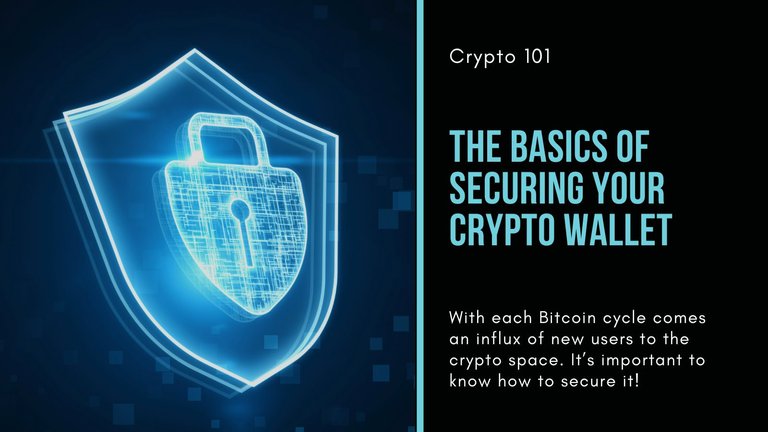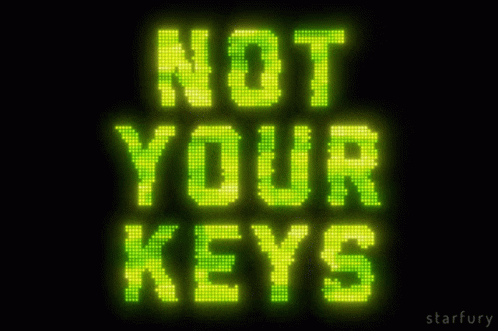
Many of you are new to the Bitcoin and cryptocurrency space and learning about the freedoms and the risks of being your own bank. As you embark on your journey as a crypto investor, it's crucial to prioritize the security of your digital assets. In this guide, we'll explore some best practices for securing your crypto wallet. You don't want to be one of those poor souls that loses their private keys or gets their account hacked and their funds drained. It's not a fun experience.
Two-Factor Authentication (2FA)
One of the simplest yet effective security measures is two-factor authentication (2FA). Think of it as an extra layer of protection beyond your password. By enabling 2FA, you add an additional step to the login process, usually involving a code sent to your mobile device or using some kind of authentication app like Google Authenticator. This small but very important step can significantly enhance the security of your accounts.
This day in time, if you are not using 2FA on pretty much every account you have, especially financial accounts, then you are doing it all wrong.
Hot Wallet Protection
Hot wallets, or online wallets, are convenient for quick access to your crypto and are the way most users get started. However, they are more susceptible to hacking compared to cold storage options because they are connected to the internet which leaves them vulnerable. To enhance the security of your hot wallet, ensure you use a strong, unique password. Regularly update your password and avoid using easily guessable phrases.
Avoid using the same password you use on your social media or like accounts. Additionally, be cautious about the devices you access your hot wallet from, and avoid using public computers or unsecured networks like public wifi hotspots. Being your own bank comes with risks, so you have to be vigilant in how you access and protect your money.
Think about using base blockchain wallets so you know you are using the most secure options that offer less counterparty risk as well.

Embrace Cold Storage
Cold storage devices are like the Fort Knox of crypto security. These physical devices store your private keys offline, away from potential online threats. Popular options include hardware wallets such as Ledger or Trezor, but there are many other devices including open source wallets that you can use if you are tech savvy enough to learn how to set it all up. Using a cold storage device adds an extra layer of protection against hacking attempts, as your keys remain offline and out of reach from cybercriminals.

Regular Security Audits
Just as you'd do a health checkup, it's essential to conduct regular security audits of your crypto accounts, or really any account for that matter. Review your account activity, ensure all devices are authorized, and verify recent transactions. If anything seems suspicious, take immediate action, like moving your funds to another wallet. Most platforms provide security features like activity logs and device tracking, not to mention the good ole blockchain explorers—make use of them to keep tabs on your crypto security.

Keep Funds off Centralized Exchanges
Last but certainly not least is get your funds off the exchanges as soon as possible unless you need it for trading purposes. The entire point of cryptocurrency is taking control over your funds, and a centralized exchange like Coinbase or Binance is no better than using a bank. They are in complete control over your funds, but you need to follow all the steps we talked about with hot wallet protection and use 2FA on all of those accounts to keep from getting hacked.
And really, we need to remember the original ethos of the cryptocurrency space, which is 'Not your keys, not your coins'! If you don't hold your private keys for your wallet, you are not in control over your funds. Many people are okay with this, but if 2022 didn't teach us anything is that exchanges can really do what they want with your funds, like manipulate markets, and buy real estate in the Bahamas...

Stay Informed
The crypto landscape is dynamic, with new security threats emerging regularly. Stay informed about the latest security trends and updates. Follow reputable sources in the crypto community, join forums, and participate in discussions. Knowledge is your best defense against potential threats, and being aware of the latest security measures can help you stay one step ahead. If you use a third party wallet like Exodus, Metamask, or Trust Wallet, then you will want to make sure to keep up with their social media accounts to follow any news or updates that involve them.
Conclusion
Congratulations on taking the first steps into the world of crypto investing! By implementing these security measures—2FA, hot wallet protection, cold storage, regular audits, keeping your coins off exchanges, and staying informed—you can significantly reduce the risks associated with cryptocurrency ownership. Remember, a proactive approach to security will not only protect your assets but also provide peace of mind as you navigate the exciting and evolving crypto landscape. So there are the basics of securing your crypto wallet, hope this helps you a bit on your journey to becoming your own bank!
This post was written for Coin Logic, my cryptocurrency research site where I bring all the market data, charts, and news to you all in one place!

Posted Using InLeo Alpha
This is useful for both the newbies and the OGs, you just reminded to double back up my keys. Thanks man
I think having the basics right is important in securing our crypto wallets. Stay informed seems the hardest to me but I try most of the time and play catch up :)
Great and informative read!
That's what Coin Logic is all about. We bring in some of the top crypto news resources all into one place as well as market data, charts, and more to help you be a more informed investor.
Great to know! I think that's important to have and make best use of in becoming a well informed investor.